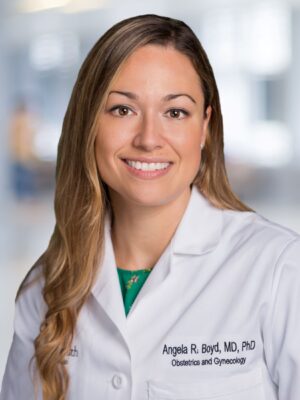Program
Our Maternal-Fetal Medicine fellowship program provides for an outstanding academic environment for training the next generation of academic Maternal-Fetal Medicine specialists.
Clinical
Our Maternal-Fetal Medicine Fellowship is a three-year program designed to qualify the candidate for advanced certification in Maternal-Fetal Medicine by the American Board of Obstetrics and Gynecology, Inc. The fellowship is fully-accredited by the Accreditation Council for Graduate Medical Education (ACGME). Our program is approved to accept one fellow annually. The Director of the MFM Fellowship at the UT Health/University of Texas Health Science Center at San Antonio is Dr. Nora Doyle. Dr. Angela Boyd is the Associate MFM fellowship Director.
Fellows completing our program will have a comprehensive skill set to allow them to serve as a consultant to other obstetric and non-obstetric providers. These skills are gained through clinical experiences, engagement in departmental/institutional quality improvement projects, participation in root-cause analyses, and peer-review. Extensive basic science and clinical resources are available through the department and institution for fellow research and thesis endeavors.
Fellows are provided with training in critical review of the literature and regularly engage in manuscript for review for one or more journals in obstetrics and gynecology. Additional unique attributes of our program include fellow participation in our South Texas Center for Placenta Accreta Spectrum, Comprehensive Zika center, Perinatal Palliative Care Program, and Multidisciplinary Maternal Cardiac Care Clinic. Fellows in the program are also required to participate in regional/state efforts to improve maternal and fetal/infant mortality.
In addition, fellows are provided with an opportunity to participate in regional and state-level advocacy and quality improvement efforts (fetal infant mortality review, regional and state perinatal advisory council, March of Dimes, etc). These additional aspects of training provide additional breadth and experiences to allow the fellow to experience the full spectrum of an academic MFM consultant.
Research
Our MFM fellowship program provides for outstanding opportunities for research training and conduct of basic science, translational and clinical research. The academic facility of the Department of Obstetrics and Gynecology houses over 12,000 square feet of laboratory space. Specific laboratories are dedicated to molecular biology, cell biology, neuroendocrinology, reproductive immunology, electron microscopy, radioimmunoassays, and infectious disease.
Our fellows may utilize any of these facilities to acquire specific laboratory skills. A major feature of the research program will be the opportunity for fellows interested in basic science to work with several different animal models, including the baboon. We have ongoing research programs into a variety of maternal and fetal disorders using different animal models.
For fellows with interest in clinical research, the institution has substantial clinical volume to accommodate clinical studies and trials of interest. Numerous databases are available for fellow use from recent studies our center has participated in including trials/studies involving preterm birth (NICHD MFMU) and dental hygiene (MOTOR), stillbirth (NICHD Stillbirth Network), and diabetes in pregnancy.
Depending on the research area of interest and planned thesis project, the 12 months of required research can be allocated into large multi-month blocks, or smaller blocks. Our fellows will have access to an extensive number of highly qualified potential mentors, both within and outside our department from which to choose for their research training. Faculty and fellows in our program have full access to the UT Health Scholars web portal to assist with identification of potential collaborators for research endeavors. The full faculty and laboratory assets of the Department and Center for Pregnancy and Newborn Research are available to our fellows to promote their research endeavors.
Training in both basic science and clinical research occurs throughout the fellowship program. Fellows will gain core training in study design, feasibility assessment and animal/human subjects protections.
Fellows are encouraged and supported to attend the Exxcellence in Clinical Research course offered by the Foundation for Exxcellence in Women’s Health, as well as the NICHD Young Investigators Conference on Maternal-Fetal-Neonatal-Reproductive Medicine. In addition to the core research training, individualized training is available to teach fellows research techniques, experimental design, data evaluation, and manuscript submission for publication of their research project.
The institutional RIA/Cell and Molecular Biology laboratories are available to provide fellows training in standard molecular biology techniques including in situ hybridization, RNA/DNA isolation and Northern and Southern blotting, polymerase chain reaction (PCR), RNA estimation using reverse transcription PCR and other methods.
The fellowship director works with the fellows to identify areas of interest and potential research opportunities in the first few months of the fellowship to allow for early research engagement during the program.
Fellows are actively encouraged to submit research abstracts to the Society for Maternal-Fetal Medicine, Society of Reproductive Investigation, Infectious Disease Society for Obstetrics & Gynecology (IDSOG), American College of Obstetricians and Gynecologists (ACOG), Association of Professors of Gynecology and Obstetrics (APGO), and other national meetings.
Completion of thesis project and defense is a requirement for the fellowship. It is anticipated that our fellows will have completed and submitted a manuscript for publication before completion of the fellowship training program.
Didactic
Our fellowship educational program includes a formal course in biostatistics and numerous weekly conferences. Didactic instruction involves both basic science and clinical aspects of maternal and fetal medicine.
The Maternal-Fetal Medicine Didactic Conference is held each week and presentations on selected topics are given by the Faculty. Topics are selected to review fundamental and current information on Maternal-Fetal Medicine as outlined in the ABOG’s “Guide to Learning in Maternal-Fetal Medicine”. MFM journal clubs are held monthly in the basic science and clinical areas.
A journal club format is utilized periodically to discuss recently published articles of special significance. Topics and articles are selected from major areas of interest in Maternal-Fetal Medicine. The Journal Club encourages fellows to keep abreast of new ideas and technical development, and often generates novel research investigations. Our fellows also lead quarterly OB/MFM journal club for the core OB/GYN residency.
Other fellow-level conferences include the Multidisciplinary Prenatal Diagnosis Conference and Perinatal Mortality Conference both held monthly and led by the fellows. Placenta Accreta/Percreta QI conference, OB Critical Care QI conference, and Severe Morbidity and Mortality Review conference are each held monthly and are part of the fellowship curriculum.
Mini-lecture series on genetics/reproductive medicine, ultrasonography, and research design/statistics are also held annually during the fellowship. In addition, all fellows are expected to enroll in, and complete, online and imaging requirements to attain certification for nuchal translucency (NTQR), cervical length (CLEAR), and fetal echocardiography (Fetal Medicine Foundation) assessments. The Society of Maternal Fetal Medicine Lecture Series and GOHO/SMFM Ultrasound Lecture Series are also integrated into the fellow’s education.
In addition to the fellow level didactics, the fellows attend and sometimes lead the Antepartum Care Conference (held weekly on Fridays), Maternal Morbidity and Mortality Conference (held Wednesdays), and Maternal Morbidity Common Cause Analysis Conference (held quarterly).
Fellowships

Nora M. Doyle, MD, MPH, MS
Professor
Fellowship Program Director

Angela R. Boyd, MD, PhD
Assistant Professor
Associate Fellowship Program Director

Patricia D. Gutierrez
Program Coordinator
